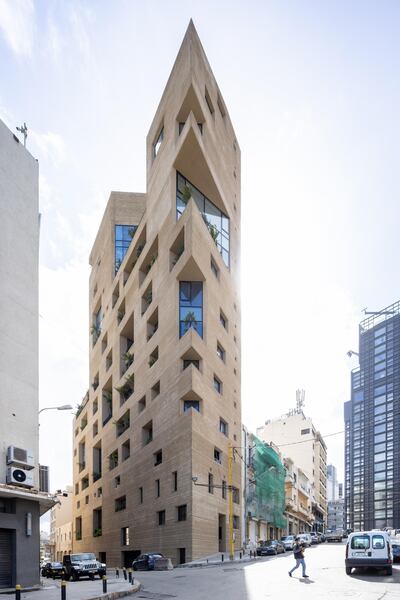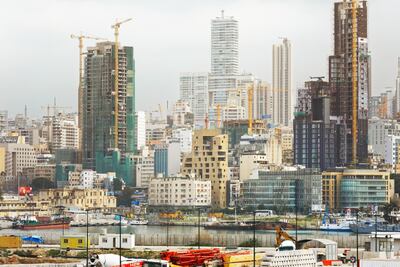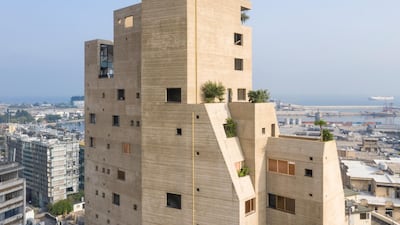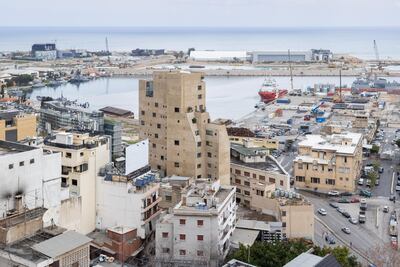There's something at once improbable and familiar, a little loud but also deeply human, about one of the newest additions to Beirut's evolving urban skyline. Stone Garden is an off-kilter 13-storey building featuring earthy striated facades, irregular elevations and glazing, planted balconies, and a mix of residential and office space with a publicly accessible art gallery and cafe.
Located midway between Beirut’s port area, the buzzing artsy district of Mar Mikhael and the glitzy but sterile downtown, Stone Garden was 10 long years in the making. Commissioned by the three children of the late Lebanese Modernist architect Pierre El Khoury, it had only recently been completed when the August 4 port explosion happened, leading to substantial external, but not structural, damage.
"Everything that was metal and glass was shattered because of the strength of the blast," says Lina Ghotmeh, the Lebanese architect, who lives in Paris, who designed the building.
While desperately trying to find out how family and friends were affected, she remembers also being anxious to discover if the building was still standing. Thankfully for Ghotmeh, for whom buildings are much more than architecture, it was.
"I try to imbue my projects with spirit, personality, humility. Buildings should talk to people and tell stories, and maybe also be political and social."
One way this project “talks” is by referencing the site’s history, where the city’s first concrete factory and El Khoury’s office once stood. “On the second floor of the new building, the windows are more vertical, in contrast to the others, to echo the outlines of the windows of the old building where El Khoury worked,” says Ghotmeh.

This notion of memory, something she refers to as “the archaeology of the future”, where every new layer is drawn from traces of the past, is crucial to Ghotmeh. In this project, there’s the memory of the building that came before, the memory of the El Khoury family, and also the memory of a city that has been reshaped over centuries.
"Beirut is like an open archaeological site, constantly revealing its guts and its history," she says. "It built in me a desire for reconstruction, a curiosity towards history and archaeology, and shaped my belief that architecture should belong to its ground, its earth, its climate."
Fittingly, Stone Garden's highly original and tactile combed facade eschews standardised materials and techniques for a mix made out of cement, metal fibres and local earth that was entirely applied by hand. Though the tower is tall compared to its low-rise 1950s neighbours, when viewed from a distance, it looks modest.
Much has been said and written about the destruction and subsequent redevelopment of the heart of the city after the civil war. The entire downtown area was bought out by Solidere, a public-private property company founded by former prime minister Rafik Hariri, which rebuilt the city centre and filled much of it with gleaming, expensive and unusually shaped towers and lofts by "starchitects", both foreign and Lebanese.
Ghotmeh's project, a joint venture between the El Khoury family and Red Development, a company that had previously only worked on one building in Beirut, is located just outside the area that falls under Solidere and represents a refreshing shift.
"I wanted my project to ask the question: 'What can we build in Beirut today? What is the identity of this place?'" One of the main criticisms of the city's downtown is its lack of soul and lack of sensitivity to the history and memory of the city, she says.
“I wanted to explore our relationship to the memory of Beirut and try to create a project that had an architectural identity, but was also attached to its place. I didn’t want it to be a signature building, but it isn’t a neutral project, either. That’s important to me, because it starts a conversation and it allows us to grow rather than be static.”
Working on major construction in Lebanon had its challenges. "In terms of organisation, it was chaotic at times," Ghotmeh admits. "But this chaos is partly what allowed for a certain creativity and experimentation on site, too."

What did bother Ghotmeh was the lack of proper framework or regulations for health and safety. "This made me angry," she says. "Together with the developer we tried to do as much as we could, but it's just not common practice there. It's a problem and it has to change."
As for being a woman on an all-male team in a largely male-orientated field, Ghotmeh says she never felt anything but comfortable. “It was very much a human relationship focused on sharing the vision of the project.”'
None of this was a surprise to her, given how much female leadership there is in Lebanon. “A lot of women are leading the charge for change there. Even if they don’t always reach representation in government, they are on the ground, running organisations, working hard and making things happen.”
Though she has lived in France since 2003, and has worked in many countries, Ghotmeh feels endlessly drawn to the Middle East. "It has such a rich culture and history, and I think many ground-breaking projects can and will grow out of the identity and history of the region."
However, her three other projects in Lebanon – a hotel in the Bekaa valley, a mixed-use tower and a private collector's museum – are all on hold owing to the country's economic and political instability. But Ghotmeh is keeping busy with a confidential project in the UAE, low carbon leather workshops for Hermes in Normandy and the urban rehabilitation of the Montparnasse Tower district in Paris, among others.
This state of affairs made Stone Garden's long fruition all the more special. "I had been wanting to contribute something to my home town for a long time," she says. "But it's also been a form of psychotherapy, if I am honest, and has helped me better understand my relationship with the city." Moving back and forth between a project that was "very personal and extremely collective, has been very interesting, too".
She remains defiantly hopeful about Lebanon. “People have a great energy and will for change, and there is so much history and culture there. It will take time, but I hope social justice, discipline and sustainable creativity will prevail.”



